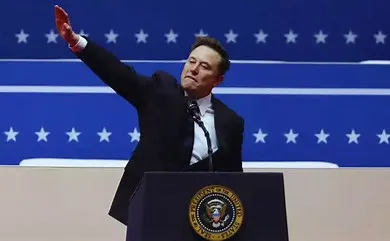Elon Musk spent an astounding $277 million (approximately A$360 million) of his personal wealth to support Donald Trump’s re-election campaign. His active involvement, from funding rallies to appearing alongside Trump, has positioned him as a prominent powerbroker in the new administration.
This massive financial contribution raises important questions: Is Musk expecting political favors in return, or does this reflect his genuine political ambitions and ideological alignment?
From Left to Alt-Right: Musk’s Political Evolution
Musk’s political journey has been anything but linear. Once a self-proclaimed left-libertarian who supported Barack Obama and Hillary Clinton, Musk now aligns more closely with the Republican Party. He attributes this shift to the Democratic Party’s alleged leftward drift.
However, a pivotal moment in Musk’s transformation was his estrangement from his transgender daughter, Vivian Jenna Wilson. Musk controversially claimed she was “killed by the woke mind virus,” a statement that reflects his opposition to transgender rights and diversity policies.
His growing alignment with far-right ideologies fits into a broader trend often referred to as the “libertarian to alt-right pipeline.” This shift highlights his increasing focus on conservative social values while maintaining his commitment to limited government and deregulation.
Musk’s Role in Trump’s Administration
Musk now heads the “Department of Government Efficiency” (DOGE) within Trump’s administration, aiming to slash $2 trillion from the U.S. budget. His focus? Eliminating diversity, equity, and inclusion (DEI) programs, which Musk views as unnecessary government expenses.
Critics argue that his motives are less about ideology and more about business. Despite his libertarian rhetoric, Musk’s companies, including Tesla and SpaceX, have benefited significantly from government subsidies. His position in the administration is likely to ensure these benefits continue.
Alt-Right Sensibilities in Action
Musk’s online persona further reflects his alt-right leanings. On X (formerly Twitter), he has amplified conspiracy theories, engaged with white nationalists, and endorsed controversial narratives like the “Great Replacement” theory.
Whether Musk genuinely believes these theories is debatable. Some experts argue his statements are a deliberate strategy to provoke controversy and stay in the public eye, aligning with the alt-right tactic of “edgelording.”
Economic and Immigration Policies: Contradictions Abound
While Musk publicly criticizes government spending, his companies heavily rely on public funding. This contradiction extends to immigration policies. Musk and Trump have voiced anti-immigration sentiments, yet Musk advocates for H1-B visas, which benefit the tech industry, including his own businesses.
This selective approach has drawn criticism from both ends of the political spectrum, exposing the complex and often contradictory nature of his positions.
What’s Next for Musk and Trump?
Musk’s alliance with Trump is a high-stakes gamble. While his influence has boosted Tesla’s stock and secured his place in the political spotlight, tensions within the administration are already emerging. His reported fallout with Vivek Ramaswamy, a fellow DOGE leader, hints at potential instability.
As Musk continues to wield his political and economic influence, his role in shaping Trump’s policies will likely attract both admiration and scrutiny. Whether this partnership heralds a new era of governance or exacerbates existing inequalities remains to be seen.









